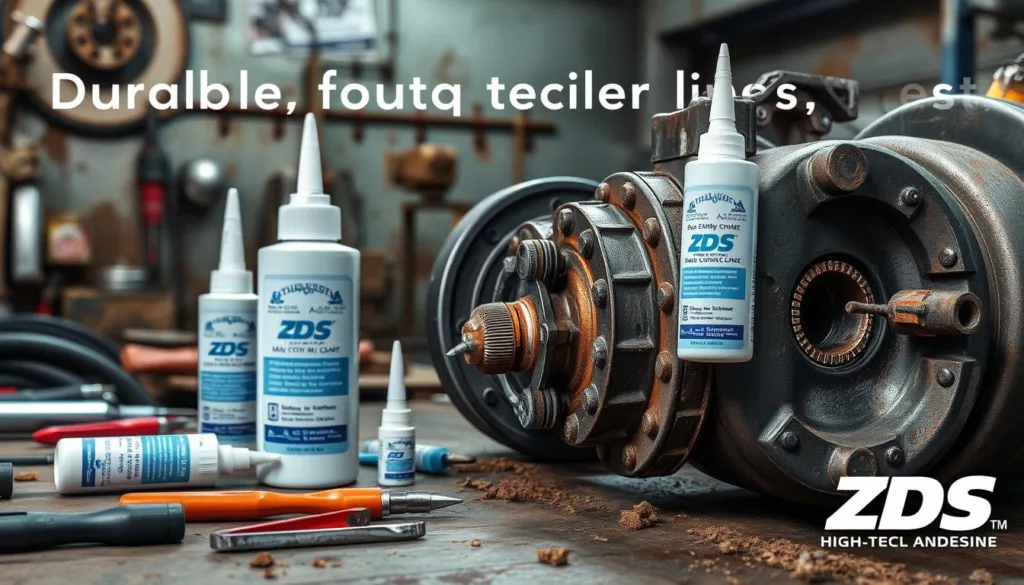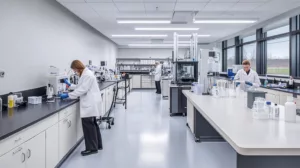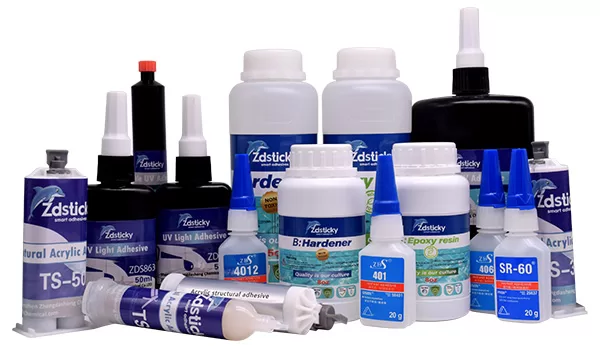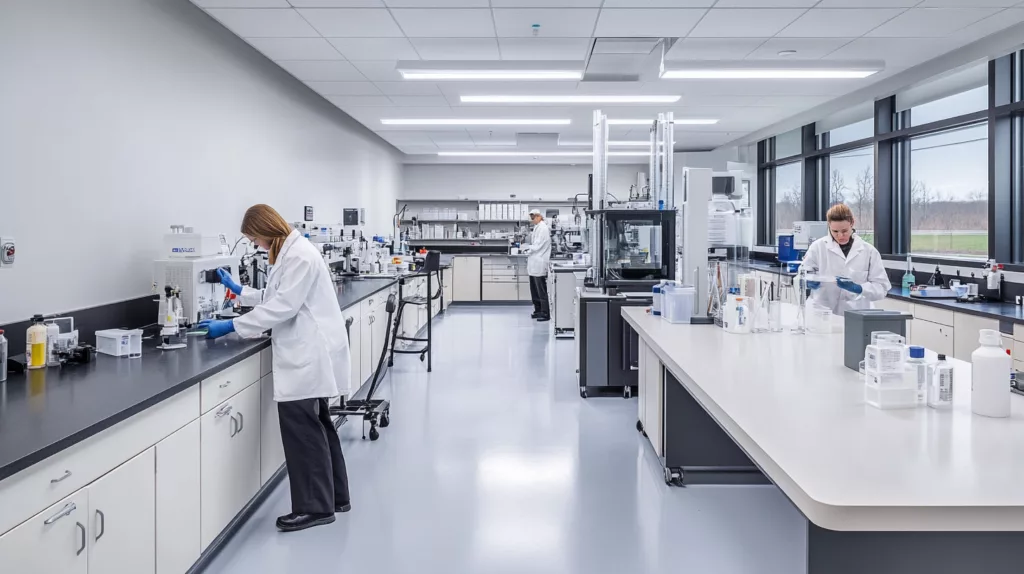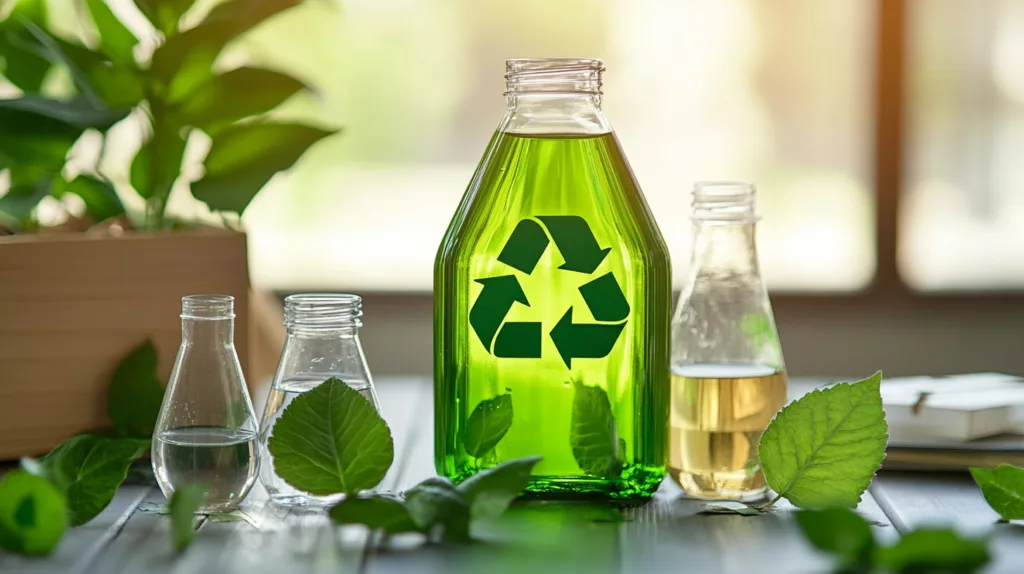In today’s fast-paced world, durable adhesives for industrial applications in harsh environments are key. These adhesives are made for tough jobs where regular adhesives can’t handle it. We offer industrial strength adhesives that are tough and reliable.
They are perfect for industries like aerospace, automotive, and construction. We know what these sectors need and work hard to meet those needs. Our goal is to make sure our customers get the best, keeping everyone safe and efficient.
Key Takeaways
- Durable adhesives are essential for high-performance applications.
- Industries like aerospace and automotive rely on quality bonding solutions.
- Our adhesives are designed to withstand harsh environmental conditions.
- Understanding industry needs drives our innovation.
- Quality craftsmanship enhances safety and efficiency.
Introduction to Durable Adhesives
Durable adhesives are key in many industries. They create strong bonds that last in tough conditions. We’ll look at what makes them special, why they’re important, and where they’re used.
What Are Durable Adhesives?
Durable adhesives are special formulas that make strong, lasting bonds. They can handle extreme temperatures, humidity, and chemicals. This makes them a must for places that need reliable and stable connections.
Importance in Industrial Settings
In factories, strong bonds are a must. Durable adhesives help keep things running smoothly, safely, and for a long time. They keep structures strong even when faced with many challenges. This makes them a big help for makers in all kinds of industries.
Overview of Harsh Environments
Harsh environments include extreme temperatures, harmful chemicals, and lots of moisture. It’s important to pick the right adhesives for these conditions. The right choice is key for success in tough places.
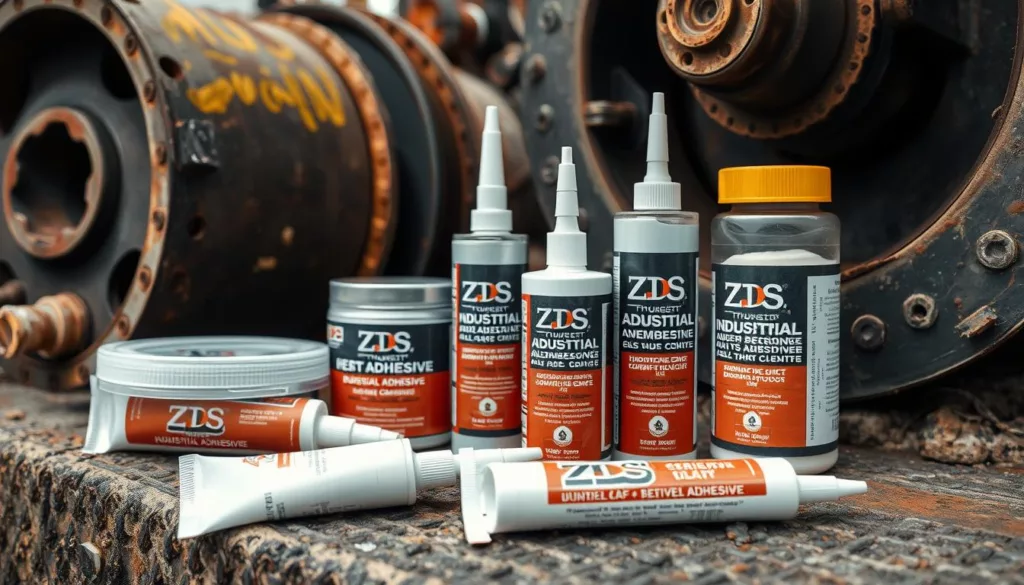
| Environment Type | Challenges | Recommended Adhesives |
|---|---|---|
| High Temperature | Thermal degradation | Epoxy, Silicone |
| High Humidity | Moisture damage | Polyurethane, Acrylic |
| Chemically Aggressive | Corrosion and attack | Epoxy, Silicone |
Types of Durable Adhesives
It’s important to know the different types of durable adhesives for various needs. Each type has unique properties for different environments. We can group them into epoxy, polyurethane, silicone, and acrylic adhesives. This helps us see how each type meets specific industrial needs, even in harsh conditions.
Epoxy Adhesives
Epoxy adhesives are very strong and rigid. They’re great for bonding metals and structures. Their strong bonds can handle extreme conditions. They’re often used in aerospace and cars, showing they’re reliable in tough settings.
Polyurethane Adhesives
Polyurethane adhesives are flexible and strong. They work well in places with movement and vibrations. They bond different materials, making them versatile in many industries.
Silicone Adhesives
Silicone adhesives work well in high temperatures. They stay sticky even in extreme heat. They’re good for electronics and cars because they last long and perform well.
Acrylic Adhesives
Acrylic adhesives dry fast, saving time. They bond well with plastics and metals. They’re used in signs and displays because they’re strong and don’t ruin the look.
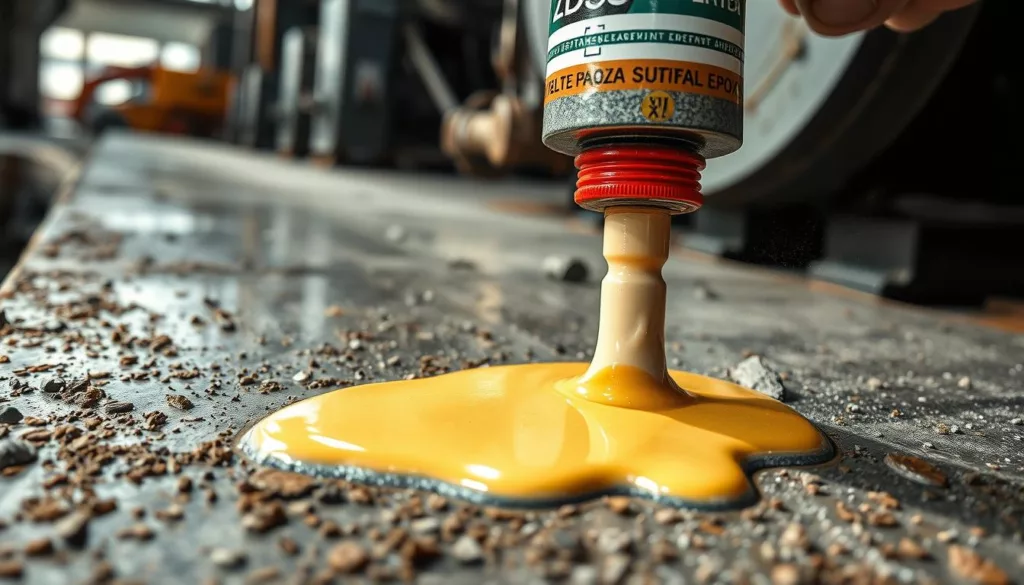
| Type of Adhesive | Key Properties | Ideal Applications |
|---|---|---|
| Epoxy Adhesives | High strength, rigidity | Aerospace, Automotive |
| Polyurethane Adhesives | Flexibility, resilience | Construction, Manufacturing |
| Silicone Adhesives | High-temperature resistance | Electronics, Automotive |
| Acrylic Adhesives | Rapid curing, transparency | Signage, Displays |
Key Properties of Industrial Adhesives
The success of industrial adhesives depends on a few key properties. Knowing these helps professionals pick the right adhesives for different jobs. This is true, even in tough conditions.
Bond Strength
Bond strength is key to keeping parts stuck together, even when forces try to pull them apart. High performance adhesives create strong bonds that can handle a lot of stress. Without strong bonds, things can fail, which is bad for safety and how well things work.
Temperature Resistance
Temperature changes are a big problem in many work places. Adhesives that can handle extreme temperatures are very useful. They stay strong in both very hot and very cold conditions. This is really important for places like airplanes and cars, where temperatures can change a lot.
Chemical Resistance
Chemical resistance helps protect against things that can damage or break down adhesives. Adhesives for tough environments must stand up to solvents, oils, and other harmful chemicals. This is very important for places like oil rigs and food factories, where safety and lasting power are key.
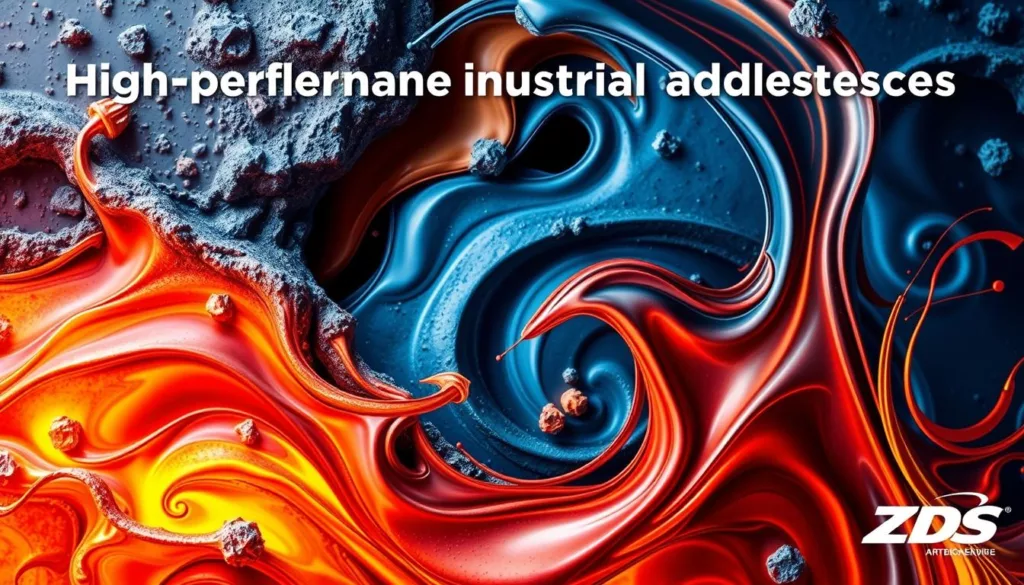
| Property | Significance | Applications |
|---|---|---|
| Bond Strength | Ensures components remain attached under stress | Aerospace, Automotive |
| Temperature Resistance | Maintains adhesive bond in extreme temperatures | Construction, Marine |
| Chemical Resistance | Resists breakdown from various chemicals | Oil and Gas, Food Processing |
Industries That Benefit from Durable Adhesives
Durable adhesives are key in many heavy-duty industries. They offer strong bonding that can handle tough environments. This makes them essential for reliability and performance.
Aerospace Industry
In aerospace, durable adhesives for industrial applications in harsh environments are vital. They help build lightweight structures. This makes planes more fuel-efficient and safer.
Automotive Industry
The car industry uses strong adhesives for body assembly. These adhesives make cars safer by improving crash resistance. They also help meet fuel efficiency standards by reducing weight.
Construction and Infrastructure
In construction, durable adhesives are critical for load-bearing structures. They ensure these structures last longer and are more stable. This makes buildings safer and more reliable.
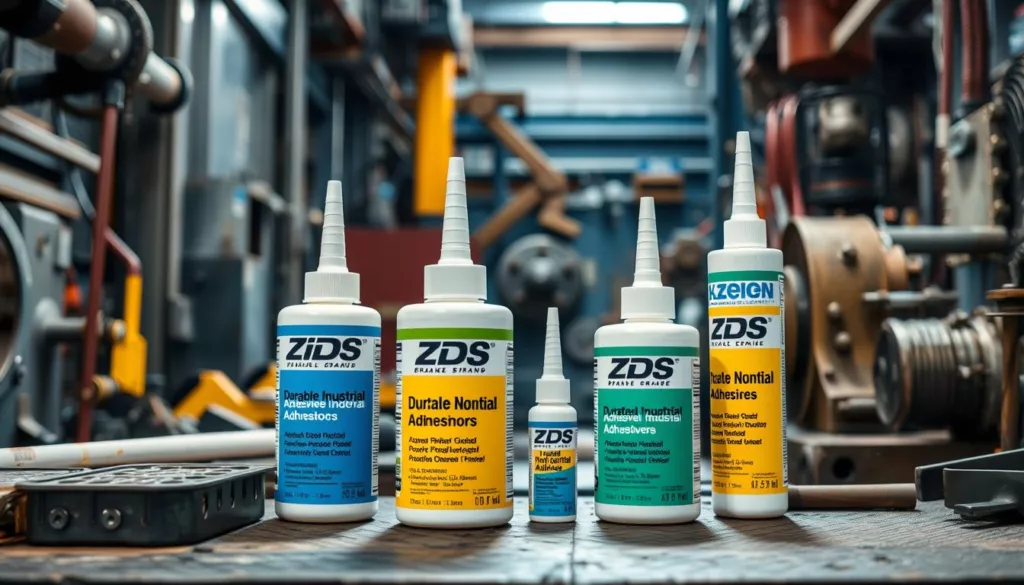
Applications in Harsh Environments
Durable adhesives are key in tough conditions across many industries. Places like the marine sector, oil and gas fields, and food processing need strong adhesives. Knowing what these areas need helps us use adhesive technology better.
Marine Applications
Marine environments are hard on adhesives, with saltwater, UV, and humidity. Special adhesives resist corrosion and last long. They keep ships strong in rough seas.
Oil and Gas Applications
The oil and gas sector has its own challenges. Adhesives must handle high pressure, extreme temperatures, and chemicals. Choosing the right adhesive, like epoxy or polyurethane, is vital for safe operations.
Food Processing Applications
Food processing adhesives must be safe and resist contaminants. High performance adhesives that follow food safety rules are essential. They ensure safe equipment and packaging, meeting both needs.
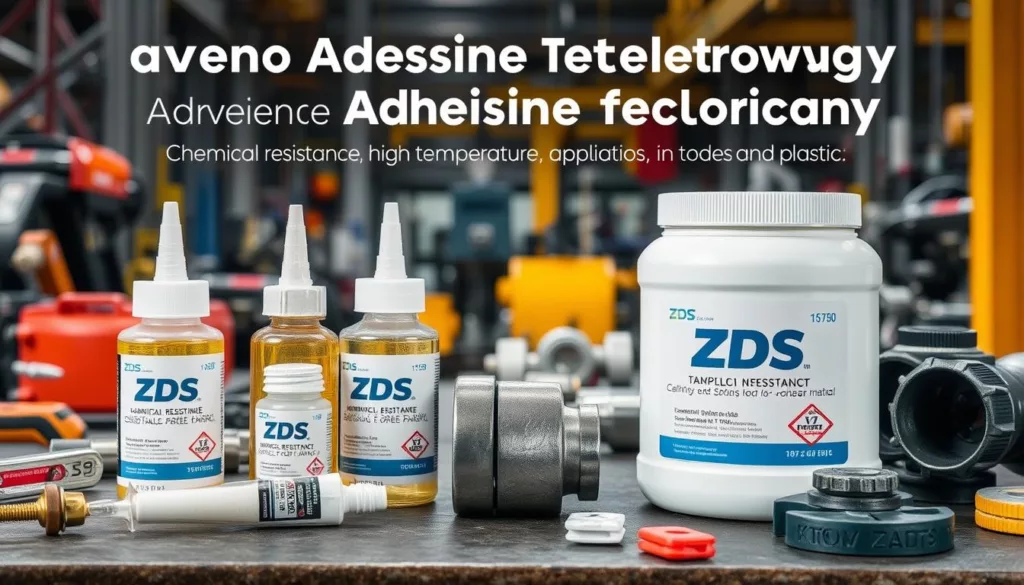
Factors Influencing Adhesive Selection
Choosing the right adhesive is key for any application. It’s important to know what factors to consider. These include the environment, the surface materials, and how much stress the adhesive will face.
By looking at these factors, you can pick the best industrial strength adhesives. This ensures your application will be strong and last long.
Environmental Conditions
The environment greatly affects how well an adhesive works. Temperature and humidity can change how the adhesive sets and how strong it becomes. UV light and chemicals can also weaken it.
It’s important to pick adhesives that can handle these challenges. This way, your results will last longer.
Surface Materials
Adhesives work differently on different materials. Metals, plastics, and composites need special adhesives. It’s important to match the adhesive with the material for the best bond.
Choosing the right industrial strength adhesives is key. This ensures a strong bond between the adhesive and the surface material.
Load and Stress Considerations
Knowing how much stress the adhesive will face is critical. It must hold up to static loads, dynamic stresses, and environmental impacts. Strong adhesives are made to handle these stresses well.
They provide reliable performance over time. This makes them perfect for tough applications.
Testing and Certification for Durability
Ensuring the durability of industrial adhesives involves strict testing and certification. These steps check how well adhesives perform under tough conditions. They prove their worth in real-world use.
Industry Standards
Many groups set standards for industrial adhesives. They look at things like bond strength and how well adhesives handle extreme temperatures and harsh chemicals. Following these standards is key for manufacturers to meet professional needs.
Performance Testing Methods
Several methods test how durable adhesives are. These include:
- Shear Testing: Checks how well adhesives resist sliding forces.
- Tensile Testing: Sees if adhesives can handle pulling forces.
- Thermal Cycling: Tests how adhesives do under big temperature changes.
- Chemical Exposure Tests: Finds out how adhesives stand up to chemicals.
Adhesives that pass these tests get certifications. This gives users confidence in their reliability for industrial use. Certifications show the value of thorough testing in making adhesives for tough jobs.
Application Techniques
Using the right techniques is key to making durable adhesives work well in industry. Knowing how to prepare surfaces, mix, and use equipment is important. It helps the adhesive perform its best.
Surface Preparation
Getting surfaces ready is the first step for a strong bond. This includes:
- Cleaning: Get rid of dirt, grease, and other stuff to help the adhesive stick better.
- Priming: Use primers to make surfaces more compatible and strengthen the bond.
- Roughening: Make smooth surfaces rougher to give the adhesive more to stick to.
Mixing and Curing Guidance
It’s important to follow the maker’s mixing and curing instructions. Mixing correctly ensures the adhesive works well. Here are some tips:
- Choose the right tools to mix everything evenly.
- Make sure to mix all parts well to avoid weak spots.
- Stick to the curing time to get the adhesive to its full strength.
Application Equipment
The equipment you use affects how well you apply the adhesive. Picking the right tools helps avoid waste and ensures accurate application:
- Manual dispensers: Great for small jobs.
- Automated systems: Best for big production lines.
- Brushes and rollers: Good for covering big areas with adhesive.
By using these methods, manufacturers can get the most out of their durable adhesives. This leads to reliable results in many industrial settings. For more information on ZDS™, including custom solutions, visit metal glue manufacturers.
Innovation in Adhesive Technology
The adhesive industry is changing fast, thanks to new technology. We see a big move towards better adhesives that are also good for the planet. New chemistry has led to high performance adhesives that dry faster and stick better.
Emerging Trends
Today, adhesives are all about doing more with less. They need to work well in tough conditions and be kind to the environment. This means making adhesives that last longer and can handle rough weather.
Sustainable and Eco-Friendly Options
More people want adhesives that are good for the earth. This push for green products is making companies create adhesives that are tough but gentle on the planet. These eco-friendly options are not just good for the environment; they also meet legal standards. For more info on green adhesives, check out ZDS Adhesives.
| Adhesive Type | Key Features | Environmental Impact |
|---|---|---|
| Epoxy Adhesives | Exceptional bond strength, heat resistance | Can contain harmful substances; seek low-VOC options |
| Polyurethane Adhesives | Flexibility, moisture resistance | Water-based versions minimize ecological footprint |
| Silicone Adhesives | Temperature resilience, waterproofing | Generally safe; aim for sustainable formulations |
| Acrylic Adhesives | Fast curing, versatile adhesion | Low environmental impact formulations available |
Case Studies of Successful Applications
Real-world examples show how durable adhesives work well in many fields. We look at aerospace and automotive to see how the right adhesives solve big problems. They also make things work better.
Aerospace Component Bonding
Epoxy adhesives are key in making planes. They help make planes lighter and stronger. This makes planes safer and more efficient.
Using epoxy adhesives lets makers use lighter materials. This meets strict safety standards. It shows how adhesives handle tough conditions in space.
Automotive Repairs
The car world benefits a lot from polyurethane adhesives. They are strong and flexible. This makes repairs on metals and plastics reliable.
These adhesives fix small damages and big repairs. They last long, even when the weather changes. Mechanics and DIY fans can learn more here.
Conclusion: Choosing the Right Adhesive
Choosing the right adhesive is key in any industrial setting. We’ve looked at different types like epoxy, polyurethane, and silicone. It’s important to know their strengths, like bond strength and temperature resistance.
Also, think about the environment, surface materials, and how much weight the adhesive will hold. These details help make the right choice.
Summary of Key Considerations
Professionals need to pick adhesives that fit their industry’s needs. We talked about how aerospace, automotive, and construction benefit from strong adhesives. Knowing these factors helps make bonding applications last longer and work better.
Future of Durable Adhesives in Industry
The future of durable adhesives looks bright with new advancements. We’ll see stronger adhesives for tough conditions. Keeping up with adhesive technology helps us make better choices for our projects.
FAQ
What are durable adhesives used for in industrial applications?
Durable adhesives are made for tough jobs in places like aerospace, cars, and buildings. They keep things safe and strong where regular adhesives can’t.
How do I choose the right adhesive for my tough application?
Choosing the right adhesive depends on several things. You need to think about the environment, the materials you’re working with, and how much stress the bond will face. Knowing what your project needs is key to getting a strong bond.
What advantages do epoxy adhesives offer in harsh environments?
Epoxy adhesives are great for bonding metals and structures in extreme conditions. They’re strong, rigid, and can handle chemicals and temperature changes well.
Can durable adhesives be used in the food processing industry?
Yes, there are durable adhesives made for food processing. They’re safe and keep their bond strong even in tough conditions.
What types of tests are conducted to ensure adhesive durability?
Tests check how strong the bond is, how it holds up to chemicals, and how long it lasts in harsh conditions. Following industry standards ensures the adhesives are reliable.
Are there eco-friendly options available for industrial adhesives?
Yes, there are eco-friendly adhesives now. They’re made to be better for the environment without sacrificing performance. This helps industries be more green.
How important is surface preparation before using industrial adhesives?
Getting the surface ready is very important. It means cleaning and priming to help the adhesive stick well and reach its full strength.
In which industries are industrial strength adhesives most commonly utilized?
Industrial strength adhesives are used a lot in aerospace, cars, construction, and oil and gas. They’re needed for jobs where reliability and performance are critical.
What role does load and stress consideration play in adhesive selection?
Knowing how much stress an adhesive will face is key. Different adhesives handle stress differently. Choosing the right one is important for a lasting bond.
What are some key properties to look for in high-performance adhesives?
Look for adhesives with strong bonds, good temperature and chemical resistance. These features help them perform well in industrial settings and last a long time.
How can I ensure that I am using the right application techniques for adhesives?
Using the right techniques means knowing how to prepare surfaces, mix and apply adhesives, and using the right tools. This ensures a strong and consistent bond.


